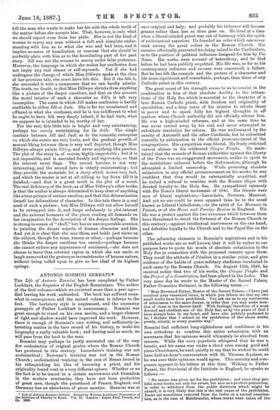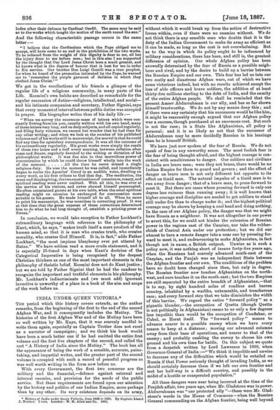ANTONIO ROSMINI SERBATI.* TEE Life of Antonio Bosmini has been
completed by Father Lockhart, the Superior of the English Rosminiaus. The author of the first volume—which we reviewed more than a year ago— died leaving his work unfinished. The book has suffered some- what in consequence, and the second volume is inferior to the first. The hortatory style is unpleasant, and the unceasing panegyric of Father Lockhart is unnecessary. Rosmini was great enough to stand on his own merits, and a larger element of light and shadow would have improved the work. However, there is enough of Rosmini's own writing, and sufficiently in- teresting matter in the bare record of his history, to make his biography a really valuable book ; and having said so much, we will pass from the book to the man.
Rosmini may perhaps be justly accounted one of the very few ecclesiastics of original genius whom the Roman Church has produced in this century. Lacordaire'e training was not ecclesiastical ; Newman's training was not in the Roman Church ; ecclesiastical training in the case of Renan issued in his relinquishing his idea of becoming a priest, and his originality found vent in a very different sphere. Whether or no the fact is to be traced to a certain narrowness and formalism in the modern seminaries, they have not been productive of great men, though the priesthood of France. England, and Germany has an abundance of pious ascetics. Rosmini was at
• Life of Antonio Bosmini &Anti. Edited by William Lockhart, Procorator of the Institute of Charity in Rome. Vol. II. London Eagan Paul, Trench, and 1896.
once original and holy; and probably his influence will become greater rather than less as time goes on. He lived at a time when a liberal-minded priest was out of harmony with the spirit of ecclesiastical superiors. He founded an order which can never rank among the great orders in the Roman Church. His enemies effectually prevented his being raised to the Cardinalate, or to the position of political influence designed for him by Pia Nono. His works were accused of heterodoxy, and he died before he had been publicly acquitted. His life was, so far as his contemporary influence and success were concerned, a failure. Buthe has left the example and the protest of a character and life more significant and remarkable, perhaps, than those of any Catholic priest in this century.
The great secret of his strength seems to us to consist in the combination in him of that absolute docility to the intima- tions of the Holy See which is essential to the character of a true Roman Catholic priest, with freedom and originality of speculation, and a deep sense of his mission to rebuke those in power and to speak fully his highest thoughts in all matters where Church authority did not officially silence him. He was a high-minded reformer, and at the same time he was never carried away by his zeal, and never attempted to substitute revolution for reform. He was undismayed by the enmity of Antonelli and the other Cardinals, but he submitted instantly by anticipation to the official pronouncement of the congregations. His sympathies were liberal. He freely criticised current abuses in his celebrated Cinque Piaghe. He main- tained that the crusade of Roman authorities against the liberty of the Press was an exaggerated movement, unlike in spirit to the restrictions enforced before the Reformation, although he advocated a limited censorship. While promising absolute submission to any official pronouncement on his works, he was confident that they would be substantially acquitted, and he united a refusal to combine with the Roman clique with devoted loyalty to the Holy See. He sympathised intensely with Pio Nono's liberal movement of 1846. His friends were men of liberal aspirations,—Lacordaire, Newman, Manzoni. And yet no one could be more opposed than he to the creed known as Liberal Catholicism,—to the spirit of La Mennaia in France, or of the Home and Foreign Renew in England. The life was a protest against the two extremes which between them have threatened to wreck the fortunes of the Roman Church in this century,—against intellectual narrowness on the one hand, and defective loyalty to the Church and to the Papal See on the other.
The reforming elements in Rosmini's aspirations and in his published works are so well known, that it will be rather to our purpose here to quote his words of absolute submission to the Holy See in connection with the proposed censure upon them. They recall the attitude of F4n4lon in a similar crisis, and give evidence of the habits of quaei-military obedience inculcated in such cases by the Roman Church. On August 15th, 1849, he received notice that two of his works, the Cinque Piaghe and the Project of a Conatitution, had been placed in the Index. The very same day he wrote to the Master of the Sacred Palace, Father Domenico Buttaoni, in the following terms :—
" Meet Reverend Father, Master of the Sacred Palace,-1have just received your venerated letter, in which you inform me that my two small works have been prohibited. You ask me as to my sentiments of submission to the same decree, in order that you may make men- tion of them in the decree itself. With feelings, therefore, of a most devoted and obedient son of the Holy See, as by the grace of God I have always been in my heart, and have also publicly professed to be, I declare that I submit to the prohibition of the above works, purely, simply, in every possible way."
Rosmini had sufficient long-sightedness and confidence in his own orthodoxy to combine this entire submission with an assurance that his opinions would ultimately be absolved from censure. While the aura popufarie whispered that he was a heretic, and his name was under a cloud even among good and pious Churchmen, housed quietly to say that he wished he could have half-an-hour's conversation with St. Thomas Aquinas, as he was sure their opinions would agree. This serenity and com- posure appears in his letters at this time. Writing to Father Penni, the Provincial of the Institute in England, he speaks as
follows :—
0 No reason was given me for the prohibition ; and since they pro- hibit some books, not only for errors, but also as a prudent precaution, in order to withdraw from the public doctrines which might be abused, it is very likely that this is the real cause of the prohibition. Books are sometimes removed from the Index on a second examina- tion, as in the case of Malebranche, whose works were taken off the
Index after their defence by Cardinal Gerdil. The same may be said as to the works whioh taught the motion of the earth round the ann."
And the following characteristic passage occurs in the same letter :—
" I believe that the Cardinalate which the Pope obliged me to accept, will have come to an end in the prohibition of the two works. To be relieved from the weight of this dignity is dear to me, all but the injury done to me before men ; but in this also I am supported by the thought that Our Lord Jeans Christ bore a much greater, and he knows what is the degree of honour that is best for me in order to His service. Our brother Don Luigi Gentili was a true prophet, for when he heard of the promotion intimated by the Pope, he warned me to 'remember the purple garment of derision in which they clothed Jesus Christ.'"
We get in the recollections of his friends a glimpse of the regular life of a religions community, in many parts of the Life. Rosmini's own habits are described ae remarkable for the regular succession of duties—religions, intellectual, and social—
and his intimate companion and secretary, Father Signini, says that every momentof interval between public duties was occupied
in prayer. His biographer writes thus of his daily life :—
"When we survey the enormous mass of letters which were con- stantly flowing from his pen, usually written with his own hand, many of these letters very long, and on deep subjects, and all copied regularly, and filling forty volumes!, we cannot but wonder that he had time for any other writing ; and when we look at the number of hie published volumes and of his works still in manuscript, the marvel is that he could find any time for epistolary correspondence. It was all the outcome of his extraordinary regularity. His great works were simply the result of those two hours and a half every morning, between collation after mass and dinner, regularly devoted to the writing or dictation of his philosophical works. It was due also to that marvellous power of concentration by which he could throw himself wholly into the work of the moment All the time he never missed a single religious duty. He rose the moment he was nailed, and immediately began to recite the Apostles' Creed in an audible voice, dwelling on every word, as his first tribute to God that day. The meditation, the mass and thanksgiving, the two examinations of conscience, rosary, and spiritual reading were never omitted. With all this, he was ever at the service of his visitor., and never showed himself preoccupied. He often entertained guests at his own table, when the usual spiritual reading might on occasion be exchanged for conversation more suitable to his guests. He made himself all to all. When he came to print his manuscript, he was merciless in correcting proof. It was at this time that the great expense of these corrections determined him to do what he had long thought of, establish a printing-press at Stress."
In conclusion, we would take exception to Father Lockhart's extraordinary language with reference to the philosophy of Kant, which, he says, "makes truth itself a mere product of the human mind, so that it is man who creates truth, who creates morality, who creates God Himself. It is, in fact," adds Father Lockhart, "the most impious blasphemy ever yet uttered by Satan." We have seldom read a more crude statement, and it is especially ill-timed in days when Kant's doctrine of the Categorical Imperative is being recognised by the deepest Christian thinkers as one of the most important elements in the philosophy of theistic belief. Rosmini does not do Kant justice ; but we are told by Father Signini that he had the candour to recognise the important and truthful elements in his philosophy. Mr. Lockhart's indiscriminate and (we must add) ignorant invective is unworthy of a place in a book of the aim and scope of the work before us.



































 Previous page
Previous page